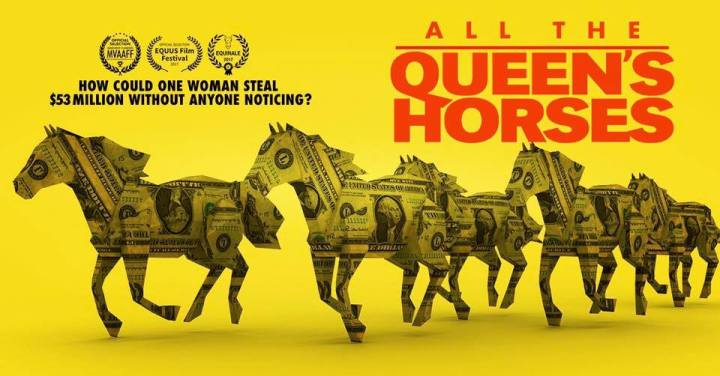
For the rest of May, “Econ Extra Credit” will be featuring a new documentary every week. First up, “All the Queen’s Horses,” which delves into a multimillion-dollar embezzlement scheme in a small town in Illinois. The film is available to stream for free (with ads) on YouTube,Tubi,Plex,PlutoTV and The Roku Channel. You can also buy or rent the film on several platforms.
Have you ever been a victim of financial fraud? If not, maybe you know someone who has.
When you imagine fraud, perhaps your mind goes to images of a rapacious CEO or a mustache-twirling villain, but those types of characters don’t necessarily represent most perpetrators in the real world.
Embezzlers tend to exhibit more subtle character traits: They are intelligent and curious individuals, who quickly learn new tasks and processes. They tend to be diligent and ambitious, the first person in the office in the morning and the last to leave at night. They rarely take vacations. They may have a job that involves finance or accounting. And they are likely to flaunt their wealth, even when their lifestyle is clearly out of proportion to their earned wages.
We don’t suspect that they could be up to this kind of stuff. And that’s what makes it so hard to catch them.
Rita Crundwell fit this archetype. She was the comptroller and treasurer for Dixon, Illinois, a city with 16,000 residents located about 100 miles west of Chicago. Whenever someone had a question about the city’s finances, they were told, “Ask Rita.” She was a trusted, valued member of the community, who worked for the local government since the 1970s, which is why it was shocking when one of her colleagues discovered she had been siphoning taxpayer dollars into a secret bank account that she used to buy boats, jewelry and horses, among other things. Over 22 years, Crundwell bamboozled the city out of $53 million.
In the documentary “All the Queen’s Horses,” filmmaker and accounting professor Kelly Richmond Pope outlined the surprisingly simple mechanics of Crundwell’s embezzlement, which auditors, bankers and other city officials failed to discover for decades.
“Everything comes back to how things are reported in your financial statements, which is why I always believe everyone needs to take an accounting class,” Richmond Pope said on “Marketplace Morning Report.”
“When fraud happens and there’s money missing, the good old accounting equation — assets equals liabilities plus stockholders’ equity — means that something’s out of balance.”
Richmond Pope argues that fraudsters are everywhere, and that given the right incentive, we all might be tempted to steal.
“[During] the pandemic … some rules [were relaxed] in order to help people, small businesses, medium-sized businesses, all businesses. And so, relaxing those rules made it much easier for people to not only think about fraud, but engage in fraud,” Richmond Pope said.
“You would never think that the entrepreneur that has a pizzeria in a strip mall would be engaging in [Paycheck Protection Program] loan fraud. You would never think that the chiropractor who has an office in the strip mall would lie about the number of employees that they have so they can receive millions and millions of dollars from the government.”
The U.S. Secret Service estimated in 2021 that fraudsters had stolen more than $100 billion of the $3.5 trillion disbursed through COVID-19 financial relief programs.
In Dixon, it was only by happenstance that the city discovered Crundwell’s fraud. A clerk who was filling in for Crundwell while she was on vacation discovered her secret bank account and reported it to Dixon’s mayor, who brought in the FBI.
To prevent fraud, Bob Brown, a founding partner of The CPA Solution, said businesses should focus on building strong systems that have checks and balances rather than relying on individuals who act as star employees.
“When we start trusting people versus trusting a system that we have in place that we can test, it becomes a real problem,” Brown said. “If you’re in an organization or you’re in a town, and you walk through the door and you look at somebody [and say], ‘I guarantee this person will never steal from me,’ you’re already a victim.”
Related Links
- Want to brush up on your financial literacy chops? Investopedia has a great guide on the most common types of financial statements and how to read them.
- If you want to understand more about white-collar crime and common “recipes” for fraud, check out Kelly Richmond Pope’s new book, “Fool Me Once: Scams, Stories, and Secrets from the Trillion-Dollar Fraud Industry.”
- Listen to Pope’s full interview on the different types of fraudsters and why people around them just let it happen.
- Listen to Bob Brown’s full interview on how local governments can prevent fraud before it happens.
There’s a lot happening in the world. Through it all, Marketplace is here for you.
You rely on Marketplace to break down the world’s events and tell you how it affects you in a fact-based, approachable way. We rely on your financial support to keep making that possible.
Your donation today powers the independent journalism that you rely on. For just $5/month, you can help sustain Marketplace so we can keep reporting on the things that matter to you.















